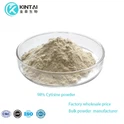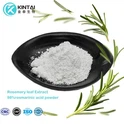In the realm of dietary supplements, HMB Ca Powder has gained significant attention in recent years. This supplement contains beta-hydroxy beta-methylbutyrate (HMB) in the form of a calcium salt. HMB is a metabolite of the essential amino acid leucine, and it has been extensively researched for its potential benefits in various aspects of health and fitness. As awareness of its potential advantages grows, HMB Ca Powder has become increasingly popular among fitness enthusiasts, athletes, and individuals seeking to optimize their physical performance and overall well-being.
Muscle Building and Recovery
One of the primary uses of HMB Ca Powder is its ability to promote muscle growth and aid in muscle recovery after exercise. Numerous studies have explored the efficacy of HMB in reducing muscle damage and improving strength gains. Research suggests that HMB supplementation may help minimize muscle breakdown and enhance protein synthesis, which are crucial processes for muscle growth and repair (Gallagher et al., 2000; Wilson et al., 2013).
By supporting muscle recovery, HMB Ca Powder may allow individuals to train harder and more frequently, ultimately leading to greater gains in muscle mass and strength over time. Furthermore, HMB has been shown to reduce the levels of creatine kinase, a marker of muscle damage, suggesting its potential in mitigating exercise-induced muscle soreness (Nissen et al., 1996).
Weight Management and Fat Loss
In addition to its muscle-building and recovery benefits, some research suggests that HMB Ca Powder may assist in weight management and fat loss, particularly when combined with exercise. Studies have indicated that HMB supplementation may help promote fat loss while preserving lean muscle mass (Vukovich et al., 2001; Nissen et al., 2000).
This effect is believed to be due to HMB's ability to increase the body's metabolic rate and enhance lipolysis (the breakdown of fat). By preserving lean muscle mass during caloric deficit or weight loss regimens, HMB Ca Powder may help individuals maintain a higher metabolic rate, making it easier to achieve and maintain a desirable body composition.
Enhanced Physical Performance
Another potential benefit of HMB Ca Powder supplementation is its ability to enhance physical performance, endurance, and stamina. Research has suggested that HMB may improve exercise capacity and delay the onset of muscle fatigue (Knitter et al., 2000; Vukovich et al., 1997).
By reducing muscle damage and promoting muscle recovery, HMB Ca Powder may allow individuals to train harder and longer, ultimately leading to improvements in athletic performance. This potential benefit makes HMB Ca Powder an attractive supplement for athletes and individuals engaged in high-intensity training or endurance activities.
Support for Muscle Health in Aging
As individuals age, they may experience a natural decline in muscle mass and function, a condition known as sarcopenia. HMB Ca Powder supplementation has been explored as a potential strategy to support muscle health and counteract age-related muscle loss (Rathmacher et al., 2004; Vukovich et al., 2001).
Research suggests that HMB may help preserve muscle mass and strength in older adults by reducing muscle breakdown and promoting muscle protein synthesis. By maintaining muscle mass and function, HMB Ca Powder may contribute to improved physical function, mobility, and overall quality of life for aging individuals.
Considerations and Safety Profile
While HMB Ca Powder is generally considered safe when consumed within recommended dosages, it is important to consider potential side effects and interactions with other medications or supplements. Some individuals may experience gastrointestinal discomfort, such as nausea or diarrhea, when taking HMB supplements.
It is crucial to consult with a healthcare professional, particularly for individuals with underlying medical conditions or those taking prescription medications, to ensure the safe and appropriate use of HMB Ca Powder. Additionally, it is advisable to follow the recommended dosages and avoid exceeding the suggested amounts, as excessive intake may increase the risk of adverse effects.
Conclusion
HMB Ca Powder offers a diverse range of potential benefits, including muscle building, weight management, enhanced physical performance, and support for muscle health, particularly in aging individuals. Its ability to promote muscle growth, aid in recovery, and potentially enhance fat loss makes it an attractive supplement for fitness enthusiasts, athletes, and those seeking to optimize their overall health and physical function.
However, it is important to recognize that individual responses to HMB Ca Powder supplementation may vary, and the efficacy of the supplement may depend on factors such as age, training status, and overall dietary habits. While the scientific evidence supporting the benefits of HMB Ca Powder is promising, it is crucial to approach supplementation with a balanced and evidence-based perspective.
Consulting with healthcare professionals and following individualized recommendations can help maximize the potential benefits of HMB Ca Powder while minimizing potential risks or adverse effects. As with any supplement or dietary intervention, it is essential to maintain realistic expectations and incorporate HMB Ca Powder supplementation as part of a comprehensive and balanced approach to health and fitness.
Our HMB Ca Powder Bulk has received unanimous praise from customers. If you would like to know more about this product, please feel free to contact Sales@Kintaibio.Com.
References:
Gallagher, P. M., Carrithers, J. A., Godard, M. P., Schulze, K. E., & Trappe, S. W. (2000). Beta-hydroxy-beta-methylbutyrate ingestion, Part I: Effects on strength and fat free mass. Medicine and Science in Sports and Exercise, 32(12), 2109-2115.
Knitter, A. E., Panton, L., Rathmacher, J. A., Petersen, A., & Sharp, R. (2000). Effects of beta-hydroxy-beta-methylbutyrate on muscle damage after a prolonged run. Journal of Applied Physiology, 89(4), 1412-1418.
Nissen, S., Sharp, R., Ray, M., Rathmacher, J. A., Rice, D., Fuller, J. C., Jr, & Abumrad, N. N. (1996). Effect of leucine metabolite beta-hydroxy-beta-methylbutyrate on muscle metabolism during resistance-exercise training. Journal of Applied Physiology, 81(5), 2095-2104.
Nissen, S., Sharp, R. L., Panton, L., Vukovich, M., Trappe, S., & Fuller, J. C., Jr. (2000). beta-Hydroxy-beta-methylbutyrate (HMB) supplementation in humans is safe and may decrease cardiovascular risk factors. The Journal of Nutrition, 130(8), 1937-1945.
Rathmacher, J. A., Nissen, S., Panton, L., Clark, R. H., Kazungu, K., & Peterson, A. (2004). Supplementation with a combination of beta-hydroxy-beta-methylbutyrate (HMB), arginine, and glutamine is safe and could improve hematological parameters. JPEN. Journal of Parenteral and Enteral Nutrition, 28(2), 65-75.
Vukovich, M. D., Slater, G., Macchi, M. B., Turner, M. J., Fallon, K., Boston, T., & Rathmacher, J. (2001). Beta-hydroxy-beta-methylbutyrate (HMB) kinetics and the influence of glucose ingestion in humans. The Journal of Nutritional Biochemistry, 12(11), 631-639.
Vukovich, M. D., Stubbs, N. B., & Bohlken, R. M. (1997). Body composition in 70-year-old adults responds to dietary beta-hydroxy-beta-methylbutyrate similarly to that of young adults. The Journal of Nutrition, 127(12), 2249-2255.
Wilson, J. M., Lowery, R. P., Joy, J. M., Andersen, J. C., Wilson, S. M., Stout, J. R., Duncan, N., Naimo, M. A., Huang, S. Y., Rathmacher, J., & Panton, L. (2013). The effects of 12 weeks of beta-hydroxy-beta-methylbutyrate free acid supplementation on muscle mass, strength, and power in resistance-trained individuals: a randomized, double-blind, placebo-controlled study. European Journal of Applied Physiology, 113(6), 1217-1227.







